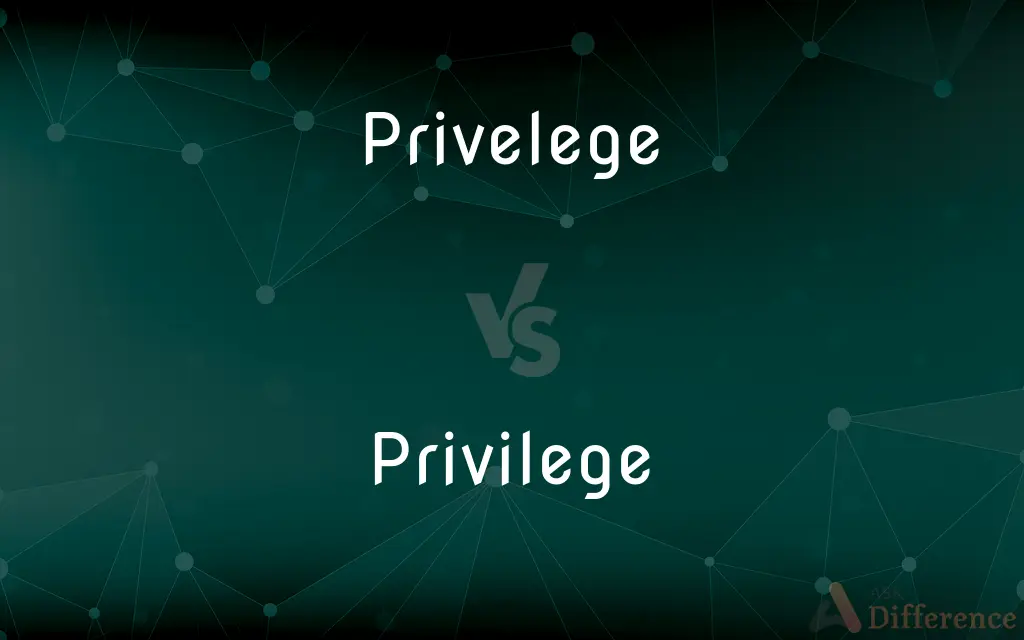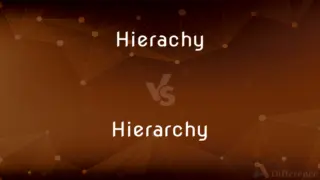Privelege vs. Privilege — Which is Correct Spelling?
Edited by Tayyaba Rehman — By Fiza Rafique — Updated on March 28, 2024
"Privelege" is an incorrect spelling, while "privilege" is the correct spelling denoting a special right or advantage.

Table of Contents
Which is correct: Privelege or Privilege
How to spell Privilege?

Privelege
Incorrect Spelling

Privilege
Correct Spelling
ADVERTISEMENT
Key Differences
Remember that "privilege" contains the word "privi" like "private".
There’s no "e" after "v" in "privilege".
Think of the word "ledge" at the end of "privilege".
Envision a VIP (Very Important Person) getting privileges, and focus on the "I" in both VIP and privilege.
The sequence of letters is "i-e-i" in the middle of "privilege".
ADVERTISEMENT
How Do You Spell Privilege Correctly?
Incorrect: Education should be a fundamental privelege for everyone.
Correct: Education should be a fundamental privilege for everyone.
Incorrect: Many people do not realize the privelege they have.
Correct: Many people do not realize the privilege they have.
Incorrect: Having access to clean water is a huge privelege in many parts of the world.
Correct: Having access to clean water is a huge privilege in many parts of the world.
Incorrect: He abused his privelege by breaking the rules.
Correct: He abused his privilege by breaking the rules.
Incorrect: It's a privelege to be part of this team.
Correct: It's a privilege to be part of this team.
Privilege Definitions
A unique benefit or advantage available to a particular person or group.
Membership offers the privilege of using the club's facilities.
A special right granted only to a particular person or group.
Being a student gives you the privilege of getting discounts.
An immunity or exemption from a usual obligation.
Diplomatic immunity is a privilege given to ambassadors.
An opportunity deemed as an honor.
It's a privilege to be invited to speak at the conference.
A special advantage, immunity, permission, right, or benefit granted to or enjoyed by an individual, class, or caste.
Such an advantage, immunity, or right held as a prerogative of status or rank, and exercised to the exclusion or detriment of others.
The principle of granting and maintaining a special right or immunity
A society based on privilege.
Protection from being forced to disclose confidential communications in certain relationships, as between attorney and client, physician and patient, or priest and confessor.
Protection from being sued for libel or slander for making otherwise actionable statements in a context or forum where open and candid expression is deemed desirable for reasons of public policy.
An option to buy or sell a stock, including put, call, spread, and straddle.
To grant a privilege to.
To free or exempt.
To assign greater importance or priority to
“A Harvard Law grad who taught constitutional law at the University of Chicago, he is steeped in a tradition that privileges the Bill of Rights over the crude or arbitrary exercise of power” (Evan Thomas).
An exemption from certain laws granted by the Pope.
(countable) A particular benefit, advantage, or favor; a right or immunity enjoyed by some but not others; a prerogative, preferential treatment.
All first-year professors here must teach four courses a term, yet you're only teaching one! What entitled you to such a privilege?
An especially rare or fortunate opportunity; the good fortune (to do something).
(uncountable) The fact of being privileged; the status or existence of (now especially social or economic) benefit or advantage within a given society.
A right or immunity enjoyed by a legislative body or its members.
A stock market option.
(legal) A common law doctrine that protects certain communications from being used as evidence in court.
Your honor, my client is not required to answer that; her response is protected by attorney-client privilege.
(computing) An ability to perform an action on the system that can be selectively granted or denied to users.
(archaic) To grant some particular right or exemption to; to invest with a peculiar right or immunity; to authorize
To privilege representatives from arrest
(archaic) To bring or put into a condition of privilege or exemption from evil or danger; to exempt; to deliver.
A peculiar benefit, advantage, or favor; a right or immunity not enjoyed by others or by all; special enjoyment of a good, or exemption from an evil or burden; a prerogative; advantage; franchise.
He pleads the legal privilege of a Roman.
The privilege birthright was a double portion.
A people inheriting privileges, franchises, and liberties.
See Call, Put, Spread, etc.
To grant some particular right or exemption to; to invest with a peculiar right or immunity; to authorize; as, to privilege representatives from arrest.
To privilege dishonor in thy name.
To bring or put into a condition of privilege or exemption from evil or danger; to exempt; to deliver.
He took this place for sanctuary, And it shall privilege him from your hands.
A special advantage or immunity or benefit not enjoyed by all
A right reserved exclusively by a particular person or group (especially a hereditary or official right);
Suffrage was the prerogative of white adult males
(law) the right to refuse to divulge information obtained in a confidential relationship
Bestow a privilege upon
An unearned advantage due to societal factors, like race or gender.
Recognizing one's own white privilege is important for societal change.
Privilege Meaning in a Sentence
Driving is a privilege, not a right.
It's a privilege to have access to higher education.
She never took her family's financial privilege for granted.
The privilege of early boarding is offered to first-class passengers.
They acknowledged their privilege in being able to travel the world.
Enjoying the privilege of good health, he led an active lifestyle.
It's a privilege to work with such talented individuals.
The children didn't understand the privilege of growing up in a safe neighborhood.
The senator's privilege protected her from immediate prosecution.
The club grants the privilege of membership to a select few.
Access to this information is a privilege reserved for senior management.
White privilege is a topic of significant discussion and analysis.
Attending the event was seen as a sign of social privilege.
It's important to use one's privilege to effect positive change.
Acknowledging one's own privilege is the first step towards understanding systemic inequalities.
The privilege of a quiet, peaceful home is undervalued.
The privilege of a new dawn is not given to everyone.
Tech workers often enjoy the privilege of working remotely.
With privilege comes the duty to act with empathy and understanding.
They used their privilege to advocate for those less fortunate.
Privilege can blind people to the struggles of others.
Educational privilege can open many doors in life.
We must recognize and address the inequalities in privilege across societies.
Privilege comes with responsibility.
Common Curiosities
Which vowel is used before privilege?
Depending on context, both "a" and "the" can be used before "privilege".
What is the root word of privilege?
The root word is from the Latin "privilegium."
Which conjunction is used with privilege?
Any conjunction (e.g., "and", "or", "but") can be used with "privilege" based on the sentence.
What is the plural form of privilege?
The plural form is "privileges".
What is the verb form of privilege?
The verb form is "privilege" as well, as in "to privilege someone or something."
What is the singular form of privilege?
The singular form is "privilege".
Is privilege a noun or adjective?
"Privilege" is primarily a noun, but it can also be used as a verb.
Is privilege an abstract noun?
Yes, "privilege" is an abstract noun as it represents an idea or concept rather than a physical entity.
Why is it called privilege?
The term "privilege" comes from the Latin "privilegium," meaning a law applying to one person, based on "privus" (individual) and "lex" (law).
What is the pronunciation of privilege?
It is pronounced as /ˈprɪv.ɪ.lɪdʒ/.
Which preposition is used with privilege?
Various prepositions can be used with "privilege" such as "of", "to", or "with" based on context.
Is privilege a negative or positive word?
"Privilege" is neutral; however, its connotation can be positive or negative based on context.
Is privilege a countable noun?
Yes, "privilege" is a countable noun.
Is the word privilege imperative?
No, "privilege" is not imperative.
Is privilege a vowel or consonant?
"Privilege" is a word and contains both vowels and consonants.
What is a stressed syllable in privilege?
The first syllable "priv" is stressed.
What part of speech is privilege?
"Privilege" is primarily a noun, but it can also be used as a verb.
What is the opposite of privilege?
The opposite might be "disadvantage" or "deprivation".
What is another term for privilege?
Another term could be "advantage" or "right".
What is the second form of privilege?
As a verb, the second form (past tense) is "privileged".
Is privilege an adverb?
No, "privilege" is not an adverb.
Is the privilege term a metaphor?
"Privilege" is not inherently a metaphor, but it can be used metaphorically in certain contexts, especially in discussions about social justice.
Which determiner is used with privilege?
Determiners like "the", "a", "an", "my", "our", etc., can be used with "privilege" based on context.
What is the first form of privilege?
The first form is "privilege".
What is the third form of privilege?
As a verb, the third form (past participle) is also "privileged".
Which article is used with privilege?
Both definite ("the") and indefinite ("a" or "an") articles can be used with "privilege" depending on context.
Is privilege a collective noun?
No, "privilege" is not a collective noun.
How many syllables are in privilege?
There are three syllables in "privilege".
How do we divide privilege into syllables?
It can be divided as: priv-i-lege.
How is privilege used in a sentence?
Example: Having access to education is a great privilege.
Share Your Discovery

Previous Comparison
Rhythym vs. Rhythm
Next Comparison
Hierachy vs. HierarchyAuthor Spotlight
Written by
Fiza RafiqueFiza Rafique is a skilled content writer at AskDifference.com, where she meticulously refines and enhances written pieces. Drawing from her vast editorial expertise, Fiza ensures clarity, accuracy, and precision in every article. Passionate about language, she continually seeks to elevate the quality of content for readers worldwide.
Edited by
Tayyaba RehmanTayyaba Rehman is a distinguished writer, currently serving as a primary contributor to askdifference.com. As a researcher in semantics and etymology, Tayyaba's passion for the complexity of languages and their distinctions has found a perfect home on the platform. Tayyaba delves into the intricacies of language, distinguishing between commonly confused words and phrases, thereby providing clarity for readers worldwide.


































